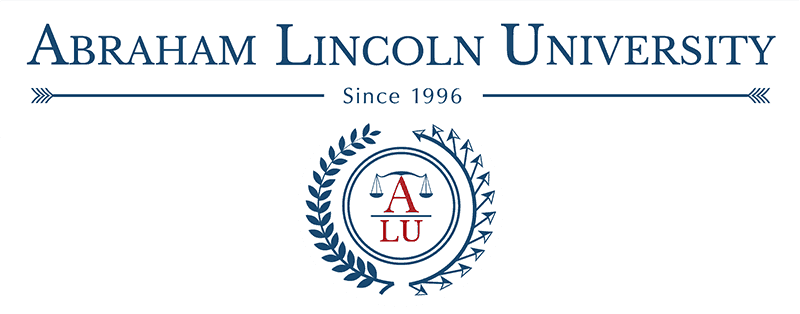University Programs
Abraham Lincoln University (ALU) was founded in 1996 by Chairman and Founder, Hyung J. Park. ALU’s mission is to offer accessible, affordable education to working adults who may be underserved by traditional institutions, especially those with only enough time after other obligations to attend a part time law school in order to earn their JD. ALU seeks to enroll a highly qualified and diverse student body from different age groups, perspectives, and backgrounds.
Once you have identified your program of interest and have had your questions answered by the ALU Admissions team or through ALU’s online admissions resources, you may complete the online application. All applicants must pay a non-refundable application fee of $50.00 by a credit card, debit card or e-check in order for applications to be processed, except for active-duty military and veteran who quality for an application fee waiver.
Abraham Lincoln University’s policy regarding confidentiality and student privacy is in accordance with the U.S. Family Educational Rights and Privacy Act (FERPA), which affords students certain rights with respect to their education records, a summary of which is as follows:
- The right to inspect and review the student’s education records within 45 days of the day Abraham Lincoln University receives a request for access.
- The right to request the amendment of parts of the student’s education records that the student believes are inaccurate.
- The right to consent to disclosures of personally identifiable information contained in the student’s education records, except to the extent that FERPA authorizes disclosure without consent.
- One exception which permits disclosure without consent is disclosure to school officials with legitimate educational interests. School officials are individuals or entities working for or on the behalf of the educational institution. A school official has a legitimate educational interest if the official needs to review an education record in order to fulfill his or her professional responsibility.
- As allowed within FERPA guidelines, Abraham Lincoln University may disclose education records without consent to officials of another school, upon request, in which a student seeks or intends to enroll.
- The right to file a complaint with the U.S Department of Education concerning alleged failure by Abraham Lincoln University to comply with the requirements of FERPA.
At its discretion, Abraham Lincoln University may provide directory information in accordance with the provisions of the Family Education Rights and Privacy Act. Directory information is defined as that information which would not generally be considered harmful or an invasion of privacy if disclosed.
To protect student privacy, students’ directory information is released only upon approval of the registrar. Students may withhold directory information by notifying the registrar in writing; please note that such withholding requests are binding for all information to all other parties, including faculty, other than for those exceptions allowed under the Act. Students may access their rights to the Maintenance and Confidentiality of their Student Records as outlined under FERPA in the University catalog.
The ALU grievance policy addresses issues requiring resolution and to promote honesty and respect inherent to the educational work of students and faculty. This policy is applicable to students, administrators, faculty or any party who has good reason to believe that the institution is not in compliance with Distance Education and Training Council standards, policies, or procedures in regard to their postgraduate studies online.
A grievance on the part of a student, staff or faculty is defined as any decision or action taken by a faculty or staff member in the course of official duty that violates or constitutes arbitrary, capricious or unequal application of written campus policies or procedures. Student complaints are typically about items such as:
- administrative issues
- financial issues
- technical issues
- faculty performance
- grading
- program content and program effectiveness/expectations
- library services
The university believes that problems can be resolved through cooperation among students, faculty and staff administrators. Fundamental to the process is the principle that all parties have made a good-faith effort to resolve the grievance prior to initiating this process.
The following are steps recommended to resolve grievances at Abraham Lincoln University:
Step 1: The student is encouraged to resolve the problem informally with the faculty or staff member involved.
Step 2: If Step 1 does not resolve the problem, the student is encouraged to communicate informally with the faculty or staff member’s supervisor.
Step 3: If Step 2 does not resolve the problem, the student should submit a written letter to Student Affairs, explaining the situation; any supporting documentation must be attached to the letter. This letter must be submitted within one month of the time the grievance occurred – the student has the right to forego the first two steps of this process and submit a letter of grievance directly to Student Affairs.
Step 4: After reviewing the grievance, the Dean shall attempt to resolve the situation directly to the mutual satisfaction of all parties.
Step 5: If such resolution is not possible through these means, the Academic Standards Committee (ASC) will conduct a hearing. The Committee shall review the grievance and render a decision in writing no later than 30 days after the letter is submitted.
Step 6: The student may appeal, in writing, any decision of the Committee to the president of Abraham Lincoln University. An appeal may also be made to the president in cases of probation, suspension, expulsion, and/or other disciplinary action. The president’s decision shall be in writing and shall be final.
Students or members of the public may also file complaints with the following entities:
Distance Education Accrediting Commission
1101 17th Street NW, Suite 808
Washington, DC 20036
202-234-5100
California Bureau for Private Postsecondary Education
Physical address: 1747 North Market, Suite 225, Sacramento, CA 95834
Mailing address: P.O. Box 980818, W. Sacramento, CA 95798-0818
Toll-free: 888-370-7589
Local: 916-431-6959
Fax: 916-263-1897
Online complaint forms are accessible at www.bppe.ca.gov.
Juris Doctor Program
Abraham Lincoln University (ALU) was founded in 1996 by President and CEO, Hyung J. Park. ALU’s mission is to offer an accessible, affordable Juris Doctor distance education law degree program to working adults who may be underserved by traditional law schools. ALU seeks to enroll a highly qualified and diverse student body from different age groups, perspectives, and backgrounds.
Applicants must have earned a bachelor’s degree from a college or university accredited by an accrediting agency recognized by the United States Department of Education. Read more about program requirements.
Once you have identified your interest in the Juris Doctor degree program and addressed questions with the ALU Admissions team, you may complete the online application. Additional information is available for those who seek transfer credit and for international students.
For applicants without prior law school academic disqualification, the Law School Admission Test (LSAT) is not required. ALU has its own assessment test that applicants take as one step of the admissions process. However, applicants seeking admission or readmission following disqualification for academic reasons must take the LSAT, except for those who have taken the test prior to their disqualification.
The review process generally takes up to 10 days, unless there are special circumstances that require follow-up with the applicant.
The school year consists of 12 months in order for students to meet the requirement that each year of the 4-year program be completed in 48-52 weeks of continuous study.
We are proud to keep our costs low and our programs accessible. ALU’s current law school tuition is $10,100.00 per year, much lower than most ABA approved law schools. Federal financial aid is available for the Juris Doctor Degree program for those who qualify. We strive to make higher education accessible to a diverse and non-traditional student body seeking to pursue postgraduate studies online.
Every ALU law student must comply with school policies (including attendance, academic engagement, and academic integrity requirements) in order to be conferred a Juris Doctor degree from Abraham Lincoln University.
The State Bar of California has a specific list of requirements that those attending law schools in California must complete prior to becoming eligible to practice in the state.
Students in the JD program must register as law students with the State Bar of California within 90 days after beginning the study of law. ALU proactively helps its students to master the skills needed to prepare for the First Year Law Students’ Examination (FYLSX, commonly referred to as the “Baby Bar”).
After their first experience with the bar exam process, students are typically better prepared to complete the required California Bar Examination (CBX) and Multi-state Professional Responsibility Examination (MPRE). In addition to passing these exams, our Juris Doctor graduates who have received a positive moral character determination and are not in arrears with family support obligations are eligible to become licensees of the State Bar of California and to practice in California.
The School of Law grievance policy addresses issues requiring resolution and promotes honesty and respect inherent to the educational work of students and faculty. This policy is applicable to students, administrators and faculty of ALU.
A grievance may involve a complaint that includes administrative issues, financial issues, technical issues, faculty performance, grading, program content, program effectiveness/expectations, or library services.
ALU will review all grievances in a timely, fair, and equitable manner. If the complaint concerns a faculty member or administrator, ALU will consult with the faculty member regarding the complaint.
ALU notifies students and other interested parties regarding how to make complaints to state agencies and accrediting agencies by providing contact information in the Accreditation and Regulation section of the JD catalog.
Step 1.
If a grievance has not been satisfactorily resolved by informal procedures, the student or interested party may file written grievance with the Dean of School of Law within 60 days of the act or event which is the subject of the grievance, by submitting the Formal Grievance Petition, available on the ALU website. Within five working days of receiving the grievance, the Dean shall conduct any necessary investigation and meet or call with the student or interested party in an effort to resolve the grievance. The Dean shall present all concerned parties with a written answer to the grievance within ten working days after the meeting or calls.
Step 2.
If a grievance has not been satisfactorily resolved at step 1, the student or interested party may file the written grievance with the Academic Standards Committee within ten working days of receiving the answer at step 1. All information presented at step 1 shall be included with the grievance, and the Dean shall submit to the Academic Standards Committee a report describing attempts to resolve the grievance at step 1.
Within ten working days of receiving the grievance, the Academic Standards Committee shall conduct any necessary investigation and meet with the student or interested party in an effort to resolve the grievance. The Academic Standards Committee shall present all concerned parties with a written answer to the grievance within ten working days after the meeting.
Step 3.
If a grievance has not been satisfactorily resolved at step 2, the student may file a written appeal to the President of Abraham Lincoln University within five working days of receiving the answer at step 2. All information presented at steps 1 and 2 shall be included with the appeal, and the Academic Standards Committee shall submit to the President a report describing attempts to resolve the grievance at step 2. Should the Dean (Step 1) and President (Step 3) be the same person, this Step will be reviewed by the same person. Any new information or supporting documentation added to the grievance petition is recommended.
The President shall make a decision within 30 days of the written appeal and shall mail the decision to all concerned parties. The President’s decision shall be final.
Students or members of the public may also file complaints with the following entities:
Distance Education Accrediting Commission
1101 17th Street NW, Suite 808
Washington, DC 20036
202-234-5100
California State Bar
180 Howard St.
San Francisco, CA 94105
415-538-2000
Abraham Lincoln University’s policy regarding confidentiality and student privacy is in keeping with the U.S. Family Educational Rights and Privacy Act (FERPA), which affords students certain rights with respect to their education records, a summary of which follows:
- The right to inspect and review the student’s education records within 45 days of the day Abraham Lincoln University receives a request for access.
- The right to request the amendment of the student’s education records that the student believes are inaccurate.
- The right to consent to disclosures of personally identifiable information contained in the student’s education records, except to the extent that FERPA authorizes disclosure without consent.
- One exception which permits disclosure without consent is disclosure to school officials with legitimate educational interests. School officials are individuals or entities working for or on the behalf of the educational institution. A school official has a legitimate educational interest if the official needs to review an education record in order to fulfill his or her professional responsibility.
- As allowed within FERPA guidelines, Abraham Lincoln University may disclose education records without consent to officials of another school, upon request, in which a student seeks or intends to enroll.
- The right to file a complaint with the U.S Department of Education concerning alleged failure by Abraham Lincoln University to comply with the requirements of FERPA.
At its discretion, Abraham Lincoln University may provide directory information in accordance with the provisions of the Family Education Rights and Privacy Act. Directory information is defined as that information which would not generally be considered harmful or an invasion of privacy if disclosed.
To protect student privacy, students’ directory information is released only upon approval of the registrar. Students may withhold directory information by notifying the registrar in writing; please note that such withholding requests are binding for all information to all other parties, including faculty, other than for those exceptions allowed under the Act. Students may access their rights to the Maintenance and Confidentiality of their Student Records as outlined under FERPA in the University catalog.





